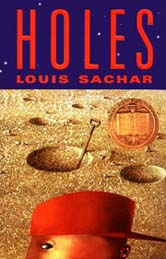by Louis Sachar
 Holes is considered to be Louis Sachar’s best work. Written for teenage readers, it is a story about the underdog that ultimately comes out on top. Among its accolades were 2 notable American awards – the National Book Award (1998 ) and the John Newbery Medal Award (1999). This made Sachar the first author in history who had won both awards for the same book.
Holes is considered to be Louis Sachar’s best work. Written for teenage readers, it is a story about the underdog that ultimately comes out on top. Among its accolades were 2 notable American awards – the National Book Award (1998 ) and the John Newbery Medal Award (1999). This made Sachar the first author in history who had won both awards for the same book.
Stanley Yelnats is sent to Camp Green Lake as a punishment for a crime he did not commit. He is given only two options by the judge – go to jail or go to Camp Green Lake. Being without money or influence, there is nothing his family can do but choose the place that sounds less daunting and blame Stanley’s bad luck on the curse placed upon his great-great-grandfather.
Stanley’s first experience of Camp Green Lake is one of disappointment. Camp Green Lake is nothing like its name. There is no lake, and there is no greenery. All that exists are holes. That is what the inmates do at Camp Green Lake – dig holes.
After residing there for some time, however, he realizes that “digging to build character”, as Mr Pendanski his counsellor puts it, is just a cover-up. But Camp Green Lake is not a place where Stanley can talk freely about any suspicion, not even to his fellow inmates. The whole place is rumoured to be rigged with surveillance equipment, such as toenail-sized cameras in the shower. The wrong word or action can bring repercussion from both supervisors and fellow inmates. Stanley cannot even be called by his own name. Everyone there has to have a nickname. So Stanley becomes “Caveman”, living a less than decent life, with cuts and blisters, a creaky and smelly bed, perpetual heat and thirst, and adult supervisors who will not think twice about ill-treating the boys.
Stanley initially gets along just fine with his group from Tent D. Then he strikes up a special friendship with Zero, who is sullen and non-communicative. Zero starts to dig part of Stanley’s hole everyday so that Stanley can help him with a problem he faces. This creates a discord among the group and it ends up in a fight one day. In the midst of it, Zero knocks Mr Pendanski out with his shovel and escapes from the Camp.
Worried for his friend, Stanley too escapes from Camp a few days later. His search leads him not only to Zero, but to a discovery that ultimately paves the way for his freedom from Camp Green Lake as well as his curse.
From the very first page, Sachar successfully creates sympathy for Stanley Yelnats. One technique he uses is to reveal to the reader certain aspects of the story even before the key character (Stanley) comes to know of it.
For example, in Chapter 1:
There is no lake at Camp Green lake…it is just a dry, flat wasteland.
and then later in Chapters 2 and 3, after Stanley is found guilty by the judge:
Stanley was from a poor family. He had never been to camp before… Stanley and his parents had tried to pretend that he was just going away to camp for a while, just like rich kids do…. At least he gets to swim in the lake.
He continues to create reader sympathy in his description of Stanley’s experience of digging his first hole:
The shovel felt heavy in Stanley’s soft, fleshy hands…the blade banged against the ground and…the vibrations ran up the shaft of the shovel and into Stanley’s wrists, making his bones rattle…Using all his might, he brought the shovel back down onto the dry lake bed. The force stung his hands but made no impression on the earth….by the time Stanley broke past the crust, a blister had formed in the middle of his right thumb, and it hurt to hold the shovel…
Sachar also keeps the suspense and the excitement of wanting to read on. He dishes out key details, such as Stanley’s purported crime, in bits and pieces. I only got to know the full facts of what he was accused of and how he came to be arrested after twenty-five pages. Then there are other sub-plots which Sachar cleverly weaves into the main story of Stanley’s life at Camp – the Yelnat curse, a romance that took place over one hundered years ago and the yellow-spotted lizard. All these kept me wondering, What has this got to do with Stanley Yelnats? until towards the end, when the whole picture is finally revealed.
Despite the harsh and unjust conditions against which the story is set, Sachar is still able to inject humour and light-hearted situations. His development of Stanley’s special friendship with Zero is a touching surprise.
The author leaves a few unanswered questions at the end of the book. This is my only dissatisfaction. Telling the reader that: “You have to fill in the holes yourself” is like completing a jigsaw puzzle and being asked to fill in the missing pieces with your own artwork.
On the whole, though, this is an extremely fulfilling book, one where Stanley Yelnats remains with you long after the book is returned to the library.

1 comment
Comments feed for this article
October 7, 2009 at 6:19 am
rodricka pearson
Holes is a good book it started off boring but in the middle it got goood to me zero is the one I liked the most.